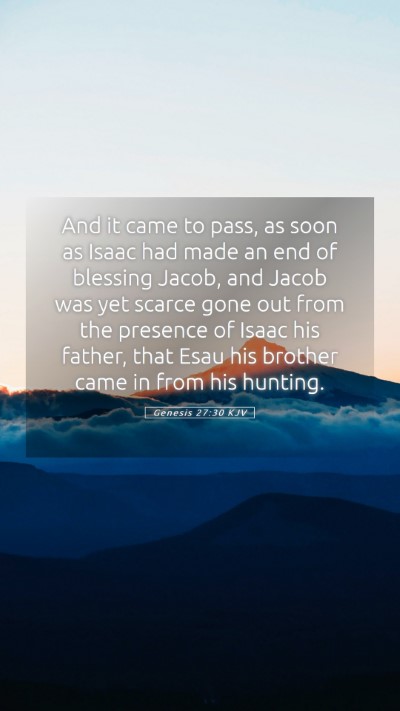Understanding Genesis 27:30
Genesis 27:30 (KJV): "And it came to pass, as soon as Isaac had made an end of blessing Jacob, and Jacob was yet scarce gone out from the presence of Isaac his father, that Esau his brother came in from his hunting."
Overview:
This verse marks a pivotal moment in the narrative of Isaac's family. It captures the immediate aftermath of Jacob's deceitful acquisition of Isaac's blessing, juxtaposed with Esau's return from hunting. This scenario sets the stage for the subsequent tension and conflict between Jacob and Esau.
Bible Verse Meanings
The meaning of this Bible verse encapsulates themes of deception, familial conflict, and divine providence. Let’s delve deeper into the insights provided by various public domain commentaries.
Matthew Henry’s Commentary
Matthew Henry observes the dramatic irony in the timing of Esau's return. He emphasizes that the blessing, which Jacob deceitfully received, was intended for Esau, showcasing the complexity of familial relationships. Henry notes the significance of the blessing, which in biblical times was a powerful ritual conferring both material and spiritual inheritance.
Albert Barnes’ Notes on the Bible
Albert Barnes highlights that this incident reflects the cunning nature of Jacob and the providential hand of God that directed events for a larger purpose. He explains that the blessing Jacob received was not merely a matter of personal gain but tied to God's promise to Abraham, thereby underscoring the importance of divine intent in the unfolding trials of Jacob and Esau.
Adam Clarke’s Commentary
Adam Clarke provides further detail on the consequences of this moment. He discusses how Esau's arrival immediately after Jacob's departure signifies the abruptness with which fate can change and the unforeseen complexities of life. Clarke warns that Jacob’s deception would lead to strife within the family, illustrating the long-term ramifications of this act.
Key Themes and Insights
- Deception and its Consequences: Jacob, aided by his mother Rebekah, deceives Isaac to claim Esau’s blessing. This act of deception, while seemingly successful in the short term, leads to familial discord and a bitter conflict between the brothers.
- Divine Sovereignty: Despite the actions of Jacob and Rebekah, God’s plan unfolds as intended. This emphasizes the theme that human actions do not thwart divine purpose.
- The Importance of Blessings: In the context of the culture of the time, blessings were not trivial; they carried weight and proved significant in the lives of individuals and families.
- Timing and Providence: The timing of events—Jacob departing just as Esau arrives—suggests a possible divine orchestration in the unfolding narrative, highlighting God's control over human affairs.
Cross References
- Genesis 25:29-34: The sale of Esau's birthright to Jacob, highlighting the conflict between the brothers.
- Genesis 27:1-4: Isaac's intention to bless Esau, setting the stage for the deception.
- Malachi 1:2-3: The divine preference for Jacob over Esau, illustrating God's sovereign choice.
Bible Study Insights
In providing a bible verse commentary on Genesis 27:30, readers are encouraged to glean insights that can be applicable to contemporary life. The themes of deception and the importance of integrity resonate through generations, prompting readers to reflect on their own actions and family dynamics.
How to Interpret Bible Verses
Understanding Scripture involves a multi-faceted approach:
- Contextual Analysis: Examining the historical and cultural background of the passage.
- Literary Techniques: Noting the use of narrative and dialogue which convey deeper meanings.
- Theological Reflection: Considering what this passage reveals about God’s character and purposes.
Application of Genesis 27:30
This moment serves as a pivotal teaching point. It prompts questions such as: How do we respond to situations that require integrity? What does it mean to pursue blessings in a way that honors God and others? Engaging with such questions can illuminate key truths as one seeks to live out scriptural principles in daily life.
Conclusion
Genesis 27:30 acts as a critical juncture in the story of Isaac's family, inviting readers to explore deeper themes of deception, divine will, and the complexities of human relationships. As part of your bible study resources, consider utilizing commentaries, group discussions, and personal reflections to enhance your understanding of this and similar passages.
Engagement with Texts
For deeper engagement, readers may consider joining bible study groups where discussions about the implications and meanings of such verses can be fruitful. Resources like bible study tools and bible study guides can also facilitate enriching exploration into the texts.


